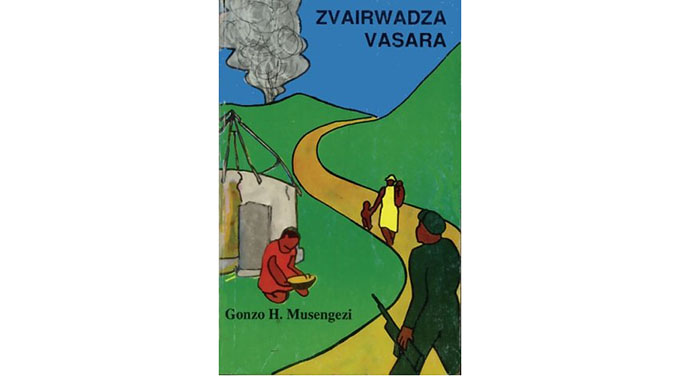When hope wears a woman’s face
Elliot Ziwira At The Bookstore
“Isanusi, I have to ask. The world we knew, the world we have put together; my father and his first General, you, my sister, and in a way General Otumfwo, that world is falling apart. At this moment I do not know who to trust. My sister and the Queen have fallen out. Our age-long tradition is being questioned and disrespected. Things that were royal prerogatives are now subject to questioning and debating. Even children born yesterday feel they have the right to question the Chief’s actions,” laments the Chief in Taban lo Liyong’s hilarious play “The Colour of Hope” (2010).
It is the seer’s candid response that puts the Chief in a fretful mode: “My lord, as somebody somewhere once said, time is out of joint . . . My dear Chief, life is changing . . . Now they (the masses) have seen through the hollowness of our world and belief.”
The evocative, thought provoking and sizzling play traverses the familiar trail of political logjam, betrayal and the nature of provocation. Through setting, characterisation and imagery, the playwright purveys the voyeuristic nature of Man as he attempts to subdue those whom he considers inferior to him; be it in brawn, mental stamina and physical attributes. So much in a hurry, he forgets that the weapon against him is fashioned from his own actions; well intentioned or ill-intentioned, and that nothing lasts forever.
There is so much cultural misnomer that even the devil is left askance. The barrenness of relationships leading to incestuous unions and bastardry makes sad reading, especially when read against the backdrop of the manner in which customary dictates are used as pedestals for political and social elevation.
From the onset, the enigma of waiting and the anxious nature of expectation are explored through the Chief and his pregnant Queen. The sex of the unborn child is linked to the fate of the entire chiefdom and metaphorically signals change. The Chief’s anxiety leads him to seek divine intervention in the interpretation of the unborn child’s sex as he believes that “human beings have among them those who have the foresight to see into the dark womb of time and divine what is to come; to see what will be born, as well as what it portends.”
When dark clouds hang on the horizon they do not always signal doom neither do they always bring boon and glee, but it is through their interpretation as culturally eschewed that the future may be deciphered. However, putting so much faith in diviners leads to charlatanism as many a time what is expected is given prominence over what is or would be, and Queen is aware of this as she tells her husband: “Likely as not, these diviners, since they speak in tongues, almost in forked tongues, when they say left they may mean right. Their grunts may hide an agreement or even a grief.”
Impatient Man seeks solutions in diviners in his quest to thwart the hand of time and strangle fate. Waiting is certainly not his forte and adaptation not his way either; whatever is culturally ensconced in him takes forever to be spewedas his ego is pampered through eulogies and praise singing.
Like most men, the Chief believes that only male children are “future inheritors” because kings “marry queens to produce for us future kings, as brave and as strong as ourselves.” It does not occur to him that a girl child could be a saviour and torchbearer.
However, there is hope, albeit short-lived, when after prying “into the womb of the dark future three times” the diviner implores the messengers to “Tell His Excellency the Chief not to worry himself unduly. His wife the Queen will deliver a healthy human child; a child whose life will bring transformations into the chiefdom.”
Through adept use of setting and characterisation, the playwright captures the bane of carnal liaisons in the moulding of an authentic vision capable of steering societal aspirations. When the Queen subsequently delivers a daughter, Princess Royal whom they call Wonders-to-Become, the Chief’s advisers invoke an age-old custom which dictates that for purposes of keeping royal blood “pure” he has to sleep with his daughter and sire an heir, much to the chagrin of the Native Advisers who are brothers to the Queen.
As the plot thickens the Chief rapes his daughter, who subsequently falls pregnant, and is caught in the act by his son, the Crown Prince who tells his mother the Queen about it. From then on events take a new twist as customs play havoc on the moral fabric that culture purports to uphold.
An alien culture brought about by the colonial Chief and his fellow imperialists functions at a tangent with the prevailing cultures of the conquered. Without interfaces of compromise humanity will always find itself pitted against itself and becoming the ultimate loser. Women are always at the receiving end of the cultural carrot stick as men think in carnal terms.
In “The Colour of Hope” women are exploited for men’s carnal pleasures with cultural blessings. This rationale is aptly captured through Auntie Makhadzie, the Chief’s sister who in a fit of rage unleashes a tirade at her brother as illuminated in the following: “The culture that creates differences to ease life for men. The culture of weakness . . . Instead of leaving our parts as they were created you have to make them trimmed to make your lives easier. Then when you learn about the lands where private parts are left natural or elongated, you then abandon us and flock there.”
Genital mutilation leads to psychological, emotional and physical pain as women are robbed of sexual pleasure, because only men are supposed to enjoy sex through hiding their own sexual weaknesses. The cultural conflict that prevails exposes men’s foibles and highlights the fact that in as much as men have a warped belief that they are in control, they remain at the mercy of women.
In the play, men are passed as sexually capable before marriage by a disguised tester, who is later known to be Auntie Makhadzie. Ironically Auntie Makhadzie’s genitalia is mutilated which makes it easier for the inexperienced men to penetrate yet she has to perform the task disinterestedly and dispassionately because none of them knows the art of pleasuring her, or even care.
She suffers the loss of her husband because of her lack of interest in bed, yet she is the tester of men’s sexual prowess before marriage. On the other hand the Chief, her brother whom he passed fails to penetrate the Queen’s elongated genitalia on their wedding day and has never been able to please her sexually in 17 years of marriage, preferring to call her a witch.
As a result the Chief seeks sexual pleasure from his sister leading to the birth of their secret daughter, Niece At Court; and the Queen runs into the arms of her secret lover The Palace Guard, who cuckolds the Chief twice, fathering two children for him. After 15 years of sexual drought following the assassination of her lover, the Queen works in cahoots with Auntie Makhadzie to be a tester for a day to quench her sexual drought. However, the inexperienced candidate fumbles and fails to penetrate and leaves in a huff calling her a witch.
Although the Chief survives an attempt on his life at the hands of the Queen who is later sentenced to death; and survives courtesy of her connections in the security circles, he eventually dies at the hands of women.
It is because of lust that the Chief meets his demise as he is killed by his frustrated sister at the testing clinic in anticipation of two more young brides. He intimates to his confidante Isanusi, “If only the young brides’ youth and beauty were not beckoning, I would have said no . . . The Chief rules the earth. But two mounds on a girl’s chest rule the chief.”
The influential yet unpopular Auntie Makhadzie and the charlatan Isanusi are hoist by their own petard, thus paving the way for change through the youth inspired by Princess Royal. Because she is aware that change is messy and that the ebullience and exuberance of youth alone falls short in moulding a national consciousness capable of bringing hope to the doorsteps of the long suffering masses, the Regent extends her hand to the wisdom of age by inviting Chief, The Uncle, her mother’s brother to give them the “fruits of (his) cogitation.”
Change for the purpose of change alone without any ideological impetus is doomed in the same way that ideology alone devoid of any clarity of vision leads an entire nation or continent even, into the mire. There is need for cultural integration, gender mainstreaming, political and religious tolerance as well as unity of purpose for the fruit trees of Eden to bear fruits for the good of all and sundry and not just a selected few.
A woman after all can do it in the same way that a man can do it or even better, as the wise Chief, The Uncle says. It is such compromise that Taban lo Liyong advocates in “The Colour of Hope” (2010).





Comments